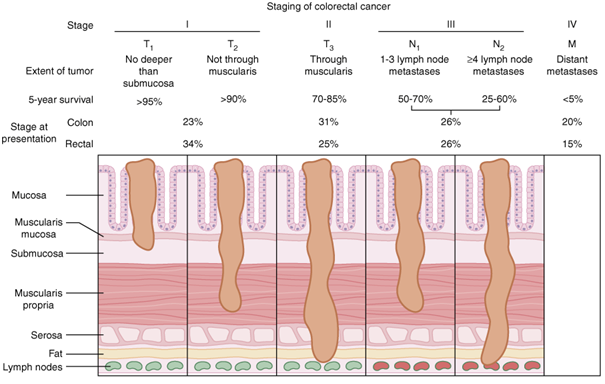

Rectum is the lower most portion of the large bowel and is about 10 to 15 cm long. It joins the anus below and act as a temporary storage for feces before they are expelled.

Cancer of the rectum and the colon have various similarities and commonly referred to as Colo-Rectal Cancer (CRC). CRC is the third most common cancer in men and second in women world wide (approx. 10% of total cancers).Rectum is situated in a tight space in the pelvis and is in close proximity to the urinary bladder, seminal vesicles and prostate in males and uterus and vagina in females. This results in involvement of these structures once the tumor spreads beyond the rectum. Additional treatment may be required to down stage the disease for a curative intent and to save the anal sphincters which controls the voluntary act of defecation. Recent advances in the understanding of the rectal cancers and introduction and adaptation of neo-adjuvant therapy has resulted in improved survival after rectal cancer.
Aberrations in the normal rectal cells where changes occur in the DNA and results in the uncontrolled and disorderly growth of the cells results in formation of the rectal cancer. With time the cancer cells divide and invade the surrounding structures resulting in the spread of the tumor.
Genetic mutations that results in increased risk of rectal cancers are-
Usually start by the age of 50 years but more frequent or early screening may be recommended if one or more risk factors are present. Screening is usually done by colonoscopy.

Rectal cancers fall into one of five possible stages (stage 0 through stage 4). The stages, in simplified form, are:
Staging also involves examining a sample of tissue taken from the tumor (a biopsy) to determine the tumor's grade. Low-grade tumors tend to grow and spread slowly. In contrast, high-grade tumors grow and spread quickly, so they may need more-aggressive treatment.
Treatment of rectal cancer is usually multimodal where one or more modality are used in combination or in sequence which helps in the improved survival of the patient.
Options available are-

Chemotherapy and Radiation therapy - are used in either before the surgery (Neo-adjuvant) or after the surgery and biopsy report (Adjuvant) depending on the stage/ evaluation of the disease.

Dr. Neeraj Dhamija expertise in Minimally Invasive Surgery (Laparoscopic & Robotic) of the Abdomen with special interest in Pancreatic Surgery. Currently working as, a consultant in the Department of Laparoscopic & General Surgery in the prestigious Sir Ganga Ram Hospital, Delhi-India.
Copyright © Laparoscopic & Robotic Gastrointestinal Surgery. All rights reserved.
satta king gali